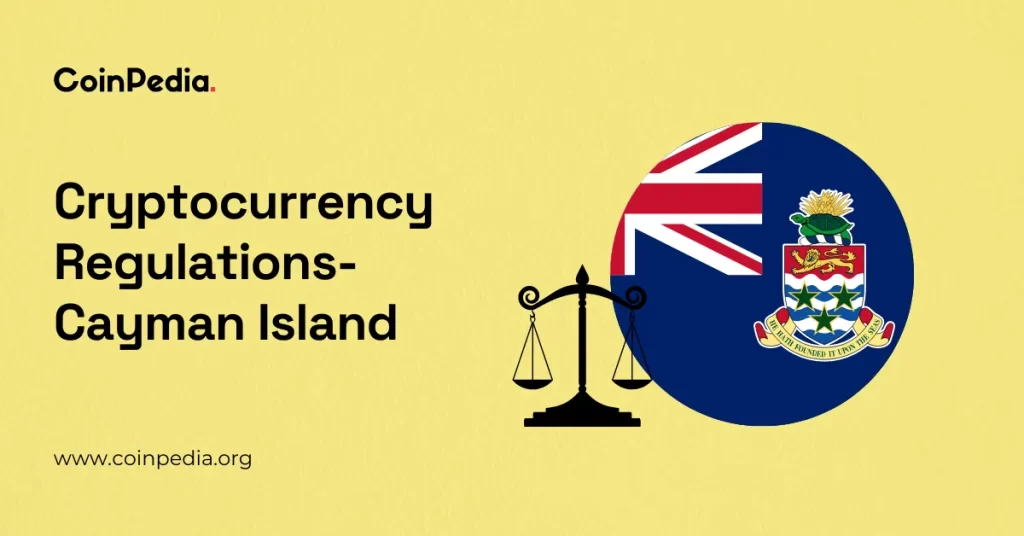Crypto Regulations in Cayman Island 2025



The post Crypto Regulations in Cayman Island 2025 appeared first on Coinpedia Fintech News
The Cayman Islands is a popular choice for crypto funds due to its well-structured jurisdiction, which creates a defined regulatory framework for digital assets. Major cryptocurrency exchanges, such as Coinbase and Binance, have already secured a license in the Cayman Islands to leverage the jurisdiction’s credibility.
Table of contents
- Crypto Regulations in the Cayman Islands
- What Is the Cayman Islands Government Saying About Crypto?
- Crypto License in the Cayman Islands 2025
- Crypto Tax in the Cayman Islands
- Crypto Adoption in the Cayman Islands 2025
- Conclusion
- FAQs
Crypto Regulations in the Cayman Islands
July 1, 2025 – Last Date to Secure a License
- Existing registered firms are required to secure a license before the deadline and comply with strict regulations of anti-money laundering (AML), counter-terrorism in finance (CFT), and maintain transparent transactions.
June 29, 2025 – Deadline for VASP license Application
- Existing virtual asset service providers must submit their license application by June 29.
- The process requires detailed disclosures about asset security and operational specifics.
April 1, 2025 – Virtual Assets Services Providers (VASPs) Act
- The Cayman Islands Monetary Authority (CIMA) is the supervising body ensuring the VASPs’ licenses.
- A VASP will now also be required to have at least three directors and will be required to submit a non-refundable fee.
Timeline of major crypto regulations in the Cayman Islands
| Date | Regulations / Law | Details |
| July 31, 2024 | VASP Act (2024 Revision ) | Mandatory segregation of client assets, enhanced disclosure, and non-refundable fees |
| February 13, 2024 | Virtual asset (service providers) amendment bill | Refining definitions of ‘operators’ and ‘convertible virtual assets’ |
| May 16, 2023 | VASP Act 2023 | Inclusion of corporate structures, clarified responsibilities, and outlined offenses |
| December 31, 2021 | VASP Act (2022 revision ) | Amendment of the regulatory landscape and refined definitions |
| January 11, 2021 | VASP (Saving and transitional regs) | Introduced transitional provisions |
| October 28, 2020 | VASP regulation | Additional specifications and operational details |
| May 25, 2020 | VASP Law | Foundational framework for regulating VASPs |
What Is the Cayman Islands Government Saying About Crypto?
The Cayman Monetary Authority (CIMA) is the primary body regulating cryptocurrency and other virtual assets. The agency’s current aim is to regulate a mandatory Virtual Asset Service Provider (VASP) license. Crypto regulators are currently focusing on:
- Anti-money laundering (AML) and counter-financing terrorism (CFT) compliance
- Preventing crypto frauds and cybercrimes
- Overseeing VASP licensing and registration
- Offering a safe environment for operating crypto-related activities, including trading, custody, and initial coin offerings (ICOs).
Crypto License in the Cayman Islands 2025
Under the new law, entities providing any crypto-related services must obtain a VASP license after registering with the Cayman Monetary Authority (CIMA). June 29, 2025, is the deadline for submitting the application for the license .
Under the 2021 enforcement, CIMA has the authority to impose penalties if any noncompliance with the VASP license is caught.
Virtual asset custodians will have to follow the obligations of:
- Fiat currency custody
- Record keeping
- Custodial arrangements with clients
- IT practices
- Client segregation requirements
VASP Obligations:
- Restriction on engaging in detrimental trading for its own benefit
- Restriction from trading icrypto n a deceptive manner
- VASPs must oblige due diligence on virtual assets and their issuers
Crypto Tax in the Cayman Islands
Is crypto taxable in the Cayman Islands? No, Cayman has a tax-free regime for crypto and has been known as a tax haven for crypto investors and businesses .
It does not impose corporate tax on businesses, and no income tax or capital gains tax on individuals. Instead of taxation, the region earns revenue through tourism, work permits, and GST.
Crypto Adoption in the Cayman Islands 2025
While there is no specific figure available for the crypto adoption rate, a growth has been experienced after the VASP license implementation. The Cayman jurisdiction is actively working to establish itself as a leader in the crypto and blockchain space.
Crypto Holdings: The Cayman Islands government’s crypto holdings have not been publicly disclosed yet. It is rather focusing on embracing innovation to create a robust crypto regulatory framework.
Conclusion
The Cayman Islands is a crypto-friendly territory that is attracting global investment funds and businesses. The Cayman government aims to establish a safe and secure landscape for digital assets with a modern cryptocurrency regulatory framework. While there is no data revealing the exact figure of the government’s crypto holdings, its strong regulatory framework suggests that it holds some assets.
Never Miss a Beat in the Crypto World!
Stay ahead with breaking news, expert analysis, and real-time updates on the latest trends in Bitcoin, altcoins, DeFi, NFTs, and more.
FAQs
No, the Cayman Islands has a tax-free regime for crypto. It imposes no corporate tax on businesses, nor income tax or capital gains tax on individuals, making it a known crypto tax haven.
Yes, the Cayman Islands is a crypto-friendly jurisdiction that attracts major crypto exchanges and investment funds. This indicates a supportive financial ecosystem, including banks that facilitate crypto-related activities for licensed entities.
The Virtual Assets Services Providers (VASPs) Act is a foundational legal framework introduced to regulate entities offering crypto-related services. It mandates licensing, enforces AML/CFT compliance, and sets standards for secure operation within the jurisdiction.
Yes, the Cayman Islands is still widely considered a tax haven for crypto. It maintains a tax-free regime with no corporate, income, or capital gains taxes on digital assets, attracting global crypto investors and businesses.
If you establish tax residency in the Cayman Islands and comply with its regulations, you generally will not be taxed on your crypto gains or income within that jurisdiction. However, your tax obligations in your country of citizenship or prior residency may still apply.

U.S.Marshals Reveals the Government Holds Only 28,988 Bitcoin Down from Nearly 200k
The post U.S.Marshals Reveals the Government Holds Only 28,988 Bitcoin Down from Nearly 200k appeare...

Ripple’s XRP Soars Above $3, Flips Tether (USDT) as 3rd Largest Crypto Asset
The post Ripple’s XRP Soars Above $3, Flips Tether (USDT) as 3rd Largest Crypto Asset appeared first...

Crypto Bills Clear Procedural Hurdles in House After Tuesday’s Failure
The post Crypto Bills Clear Procedural Hurdles in House After Tuesday’s Failure appeared first on C...

